Yeah that 1/3 claim was wild.
You are using an out of date browser. It may not display this or other websites correctly.
You should upgrade or use an alternative browser.
You should upgrade or use an alternative browser.
Poll: Do you have, or plan to get, an electric car?
- Thread starter Oldpaddy
- Start date

Help Support Homebrew Talk - Beer, Wine, Mead, & Cider Brewing Discussion Forum:
This site may earn a commission from merchant affiliate
links, including eBay, Amazon, and others.
- Joined
- Feb 16, 2012
- Messages
- 3,378
- Reaction score
- 4,298
- Location
- Either in the brewery or on the road
Maybe if you used constant defrost, had the cabin temperature at 90F/30C, and used seat heaters….Yeah that 1/3 claim was wild.
Bilsch
Well-Known Member
- Joined
- May 4, 2015
- Messages
- 1,677
- Reaction score
- 1,517
Maybe if you did that in a Bolt or Mach E you might could double your range loss. And dragged an anchor.Maybe if you used constant defrost, had the cabin temperature at 90F/30C, and used seat heaters….
In my mild winters I've seen ~20% range reduction in both a 2012 Leaf and 2018 Bolt.
not my numbers, my neighbour's. He drives an older model 3 and says that unless he uses it every day, the battery just doesn't stay charged below -15.
Bilsch
Well-Known Member
- Joined
- May 4, 2015
- Messages
- 1,677
- Reaction score
- 1,517
Cars with no or poor battery thermal management systems, like the models you mentioned, are the worst. However in brands where these things are engineered correctly then low temps will be of no concern.In my mild winters I've seen ~20% range reduction in both a 2012 Leaf and 2018 Bolt.
Bilsch
Well-Known Member
- Joined
- May 4, 2015
- Messages
- 1,677
- Reaction score
- 1,517
Then there is something wrong with his vehicle and he should seek service because that is not normal.not my numbers, my neighbour's. He drives an older model 3 and says that unless he uses it every day, the battery just doesn't stay charged below -15.
Compromises must be made. Good battery temperature management, (and heat pumps for cabin HVAC), are highly desirable features, especially in harsh climates. I'm not sure it's completely correct to call their absence incorrect, but I certainly hope my next EV has both.engineered correctly
Bilsch
Well-Known Member
- Joined
- May 4, 2015
- Messages
- 1,677
- Reaction score
- 1,517
Compromises must be made. Good battery temperature management, (and heat pumps for cabin HVAC), are highly desirable features, especially in harsh climates. I'm not sure it's completely correct to call their absence incorrect, but I certainly hope my next EV has both.
Fair enough.
It would be interesting to see some kind of apples-to-apples comparison of season/weather (temperature) impact on the real world performance of various EVs, in terms of both range and battery longevity.
I assume that battery temperature management adds weight and cost, and helps most in extreme climates (e.g. Arizona, Savonlinna). Conversely, less valuable in moderate climates (e.g. Portland, OR).
Might not matter much: unlike cabin features like heated seats, it's probably impractical for manufacturers to offer battery temperature management as an option.
I assume that battery temperature management adds weight and cost, and helps most in extreme climates (e.g. Arizona, Savonlinna). Conversely, less valuable in moderate climates (e.g. Portland, OR).
Might not matter much: unlike cabin features like heated seats, it's probably impractical for manufacturers to offer battery temperature management as an option.
Some of the Tesla folks know this stuff better than I do, but my understanding is that battery thermal management is pretty critical regardless of climate. Battery thermal management is important during charging I think both for charging speed and for battery longevity. People have talked about one of the big advantages of Tesla with the integration of the Supercharger network is that the car can be planning out your charging stops in advance. For the last couple of minutes as you're approaching the charger, the car is already doing the thermal management needed for most efficient charging.
Is additional thermal management needed for hot/cold climates? I don't know. But I think some level of thermal battery management has become "table stakes" if you want to participate in the EV market. Cars like the early Nissan Leaf generations have shown what happens if you don't do it.
Is additional thermal management needed for hot/cold climates? I don't know. But I think some level of thermal battery management has become "table stakes" if you want to participate in the EV market. Cars like the early Nissan Leaf generations have shown what happens if you don't do it.
That chart is wild.Not going to dispute your opinions of EV ownership in Finland because I don't live there but I am going to call BS on your range loss in cold figures. I've owned my Model S for 6 years and have driven many times in -20 weather as I live in a northern state. I've never seen even a 20% loss in range much less 66%. I think you pulled that number out of cold air.
View attachment 838626
Especially that is only 32F vs 70F.
A -20F and 0F chart would be quite telling. I'm curious at what point the Tesla temperature management would fail to keep up.
Hmmmm. As a Model Y owner, that chart seems a bit questionable.That chart is wild.
Especially that is only 32F vs 70F.
A -20F and 0F chart would be quite telling. I'm curious at what point the Tesla temperature management would fail to keep up.
https://arstechnica.com/cars/2024/01/hertz-is-selling-20000-used-evs-due-to-high-repair-costs/
takeaways:
takeaways:
- Hertz is selling a bunch of EVs, links in article if want to shop. No idea where/how.
- People who rent Teslas appear to crash more?
- I wonder what typical fleet turnover is. The real question is whether vehicles are replaced, not that they're being sold.
Bilsch
Well-Known Member
- Joined
- May 4, 2015
- Messages
- 1,677
- Reaction score
- 1,517
https://arstechnica.com/cars/2024/01/hertz-is-selling-20000-used-evs-due-to-high-repair-costs/
takeaways:
Also, I just thought of Tesla's new PR campaign re autopilot-related accidents: "Teslas don't crash Teslas. People crash Teslas." PM me if you want to license that, Tesla!
- Hertz is selling a bunch of EVs, links in article if want to shop. No idea where/how.
- People who rent Teslas appear to crash more?
- I wonder what typical fleet turnover is. The real question is whether vehicles are replaced, not that they're being sold.
Out of 20,000 electric vehicles that Hertz is selling 607 are Teslas.
I can believe that people new to EV who jump in one and go might be more prone to crashing. The foot full on the gas is quite addictive and dangerous when you aren't used to it. Also beat it like you rented it probably applies here as well.
Out of 20,000 electric vehicles that Hertz is selling 607 are Teslas.
No. Currently "the company has over 700 EVs for sale" and of that, 673 are Teslas.
If one were to extrapolate that out to 20000 vehicles, over 19 thousand of them would be Teslas...
Cheers!
Bilsch
Well-Known Member
- Joined
- May 4, 2015
- Messages
- 1,677
- Reaction score
- 1,517
No. Currently "the company has over 700 EVs for sale" and of that, 673 are Teslas.
If one were to extrapolate that out to 20000 vehicles, over 19 thousand of them would be Teslas...
Cheers!
https://www.cbsnews.com/news/tesla-cars-used-hertz-discount-ev-fleet/
Bilsch
Well-Known Member
- Joined
- May 4, 2015
- Messages
- 1,677
- Reaction score
- 1,517
Guess it depends on what you read and where.
Or maybe it depends on how you read. "Hertz plans to sell 20,000 electric vehicles..." doesn't mean that they're selling all of them right now or that the ones that aren't listed yet don't include any Teslas.Guess it depends on what you read and where.
I never understood why Hertz went all in on EVs unless it was purely a marketing thing. The awareness, technology, and infrastructure just isn’t there yet IMO. The way people use rental cars is often very different from how they use personal cars.
11% of the fleet is "all in"?
11% of the fleet is still a large enough chunk to be both notable, and to require changes in their business practices! We rented from them last year while travelling in Europe, and they kept reaching out asking if we'd be willing to take an EV. It felt very much like they were underbooked on EVs and trying to do what they could to get someone to take one.11% of the fleet is "all in"?
When supercharging our Tesla near DC a few months back we had someone park in the charging stall next to us who had just rented a Model 3 from Hertz for a cross-country trek to Montana. They hadn't checked about hotel charging, and were clueless as to how to search for superchargers along their route - relying on Google Maps on their phones. I'm going to guess that they ended the trip turned off to EVs.
The Hertz agent was quite helpful when I rented a Tesla. Came to the car with me and gave a pretty decent walkthrough. I had already done lots of operating research in advance so I was reasonably good to go regardless.
But, I rented from a neighborhood store not a busy airport, and when they asked if I'd driven a Tesla I said No.
If someone never read up or didn't get a decent walkthrough, it could be challenging to try to figure it all out on the fly on a timeline.
But, I rented from a neighborhood store not a busy airport, and when they asked if I'd driven a Tesla I said No.
If someone never read up or didn't get a decent walkthrough, it could be challenging to try to figure it all out on the fly on a timeline.
I wonder if these Hertz Teslas will become the 'Rent a Racer' GT350 H Mustang collector cars of the future
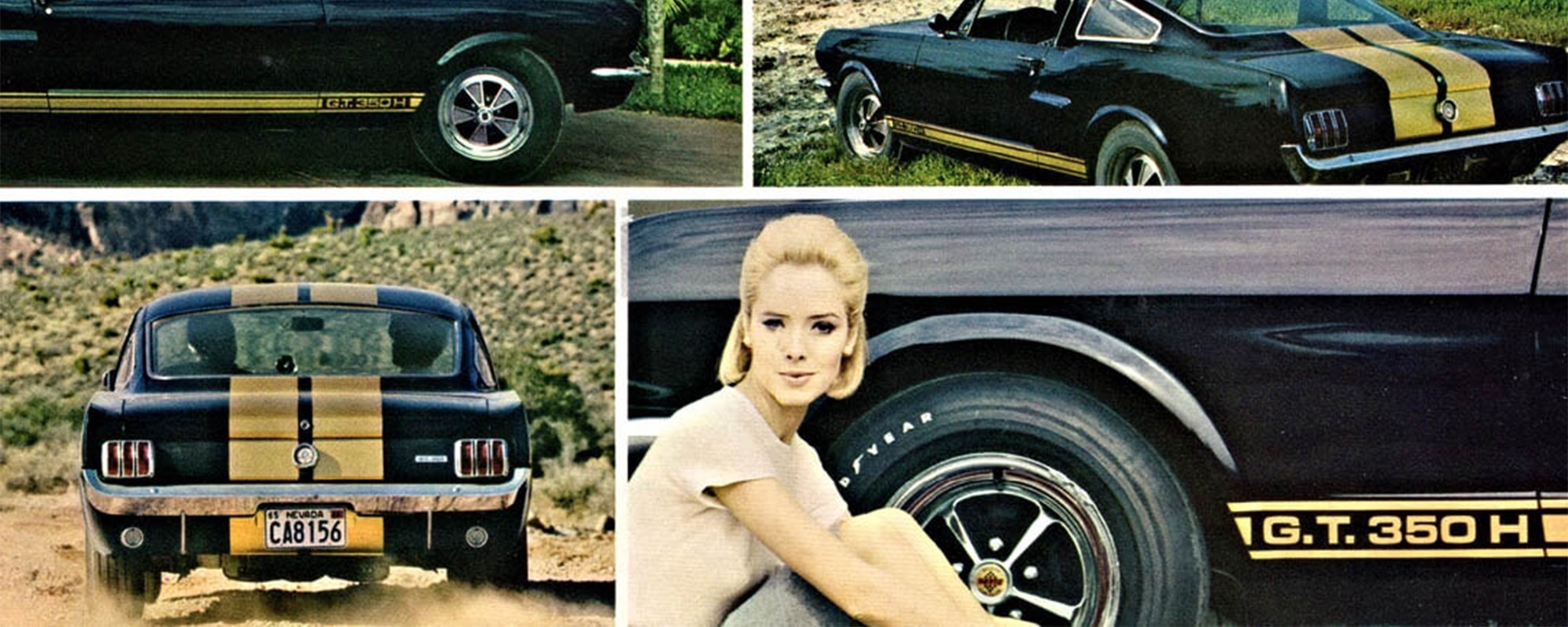

Maybe if they had Plaid models for rental with a Hertz special paint scheme.I wonder if these Hertz Teslas will become the 'Rent a Racer' GT350 H Mustang collector cars of the future
I wonder if these Hertz Teslas will become the 'Rent a Racer' GT350 H Mustang collector cars of the future
I rented this two or three years ago. My guess is they're collectable.
Hertz-Hendrick ZL1 Camaro. 6.2L supercharged, 750 horsepower.
I had #5 of 24.
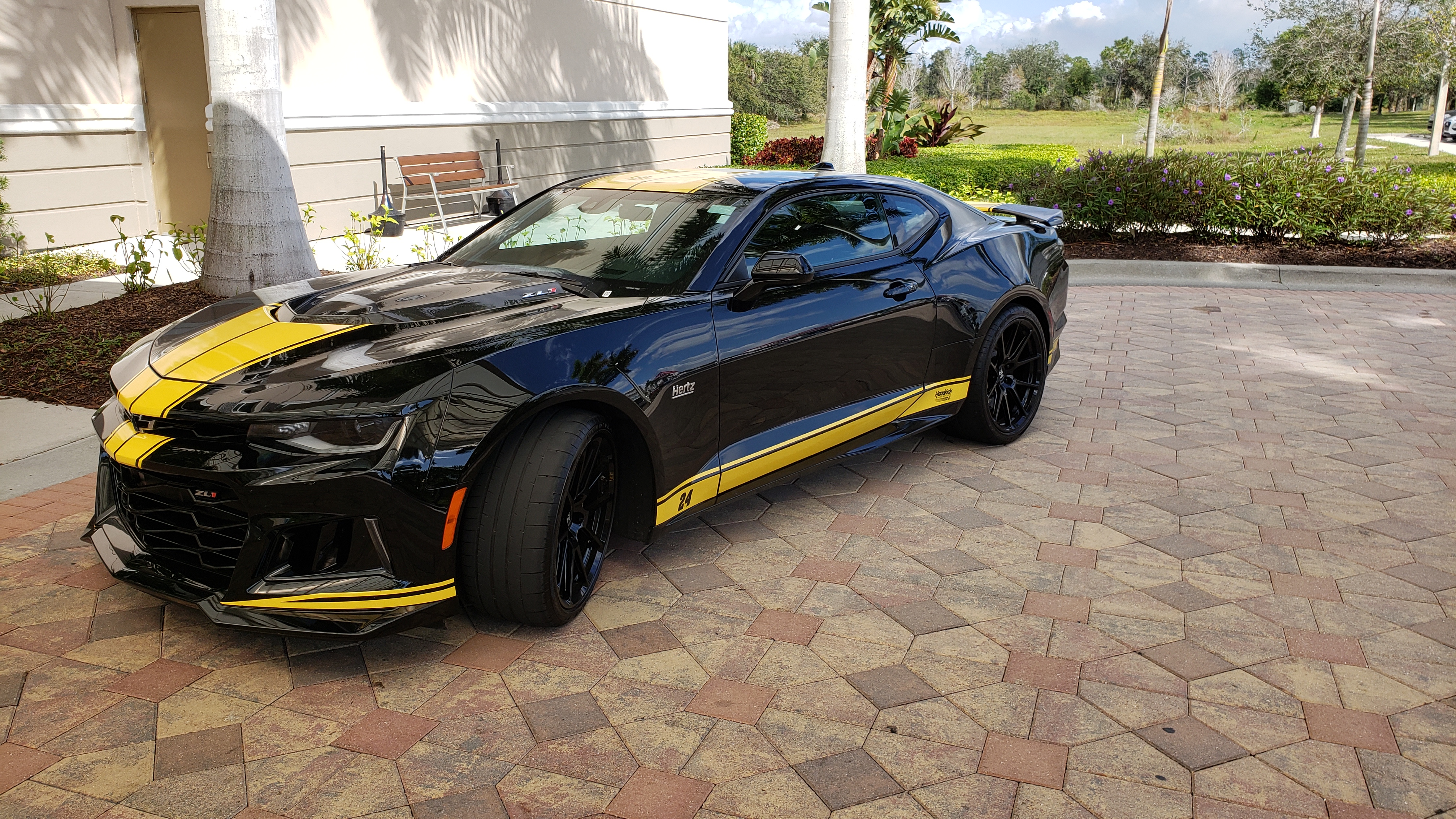
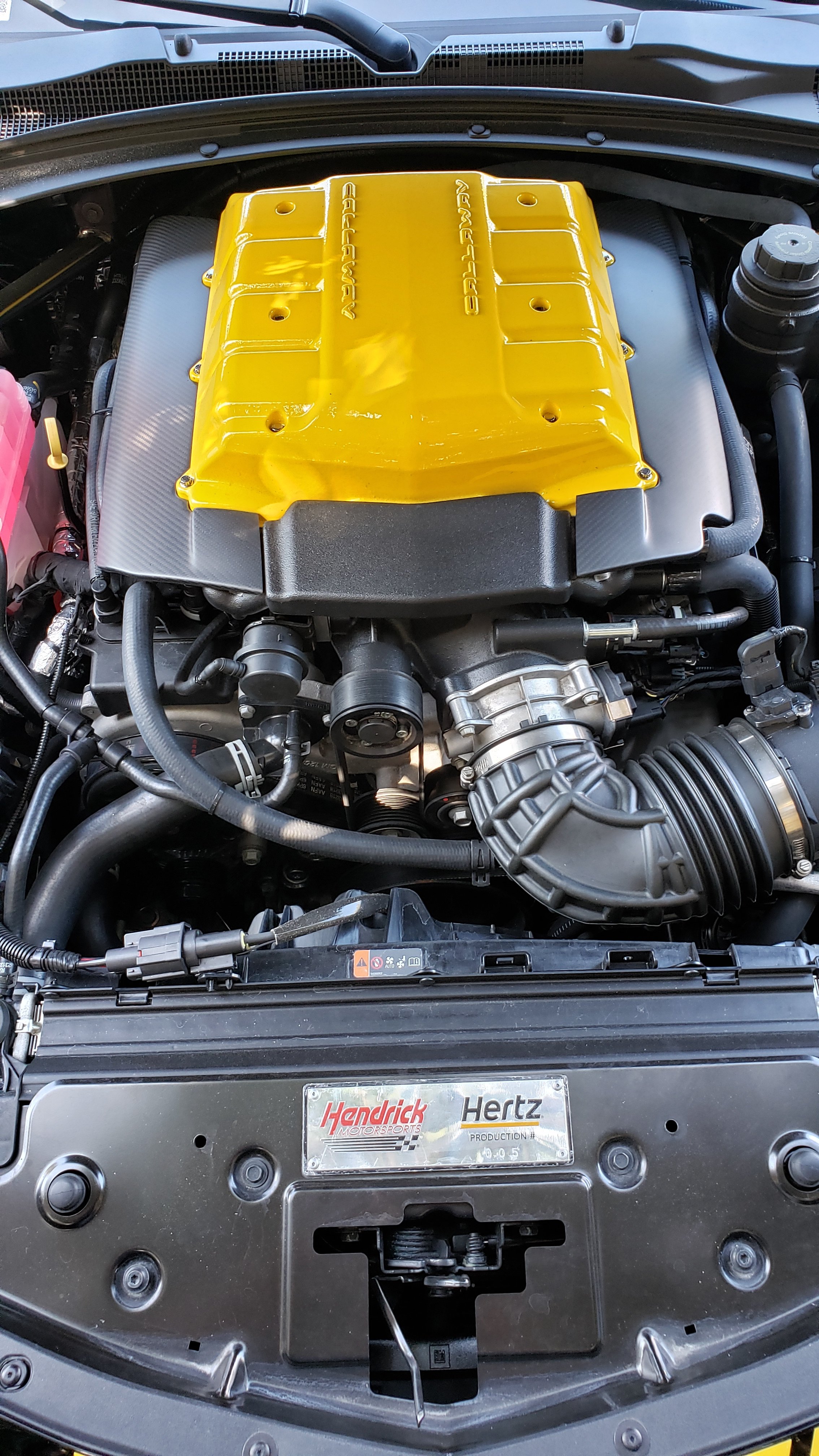
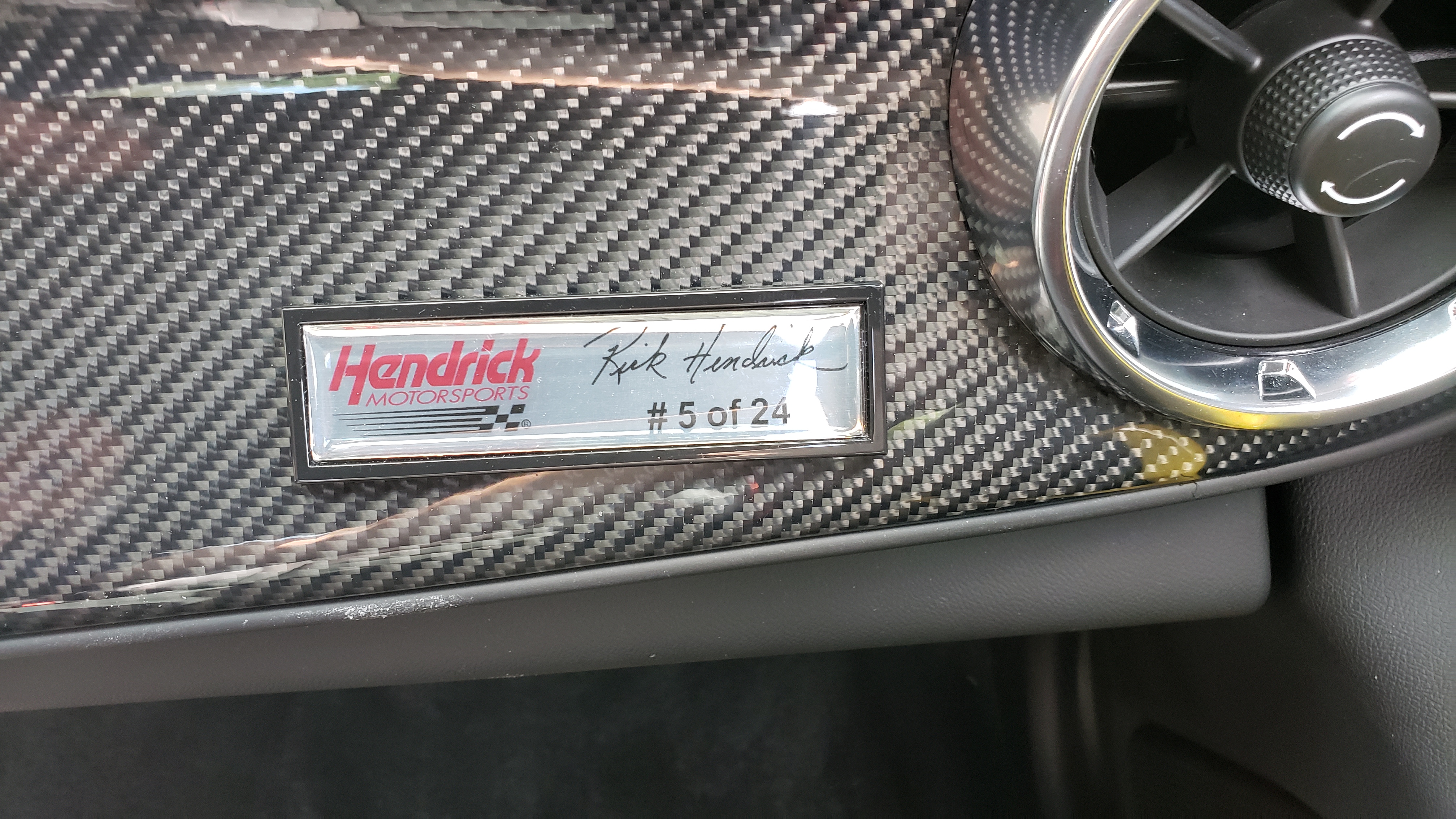
Last edited:
More charging infrastructure coming.
Rodrigue Planck
Active Member
Hertz, selling 33% of their EVs and buying gas.
"Tell us you didn't read the thread yesterday without saying you didn't read the thread yesterday" 
Cheers!
Cheers!
Hertz, selling 33% of their EVs and buying gas.
True. Why? What are your thoughts about it?
It's the drive-by deposits with no actual personal opinions on them that drive me nuts. Don't just share the article, try and also share an opinion about it.
They hadn't checked about hotel charging, and were clueless as to how to search for superchargers along their route
What are some good resources for finding hotels with chargers? I think I once found a hotel-mode on PlugShare, but I wasn't really impressed with what they were showing. No obvious distinction between hotels where there happens to be a public charging station nearby, or if you would have to be staying at the hotel to use it. Also, it was really easy to fat-thumb out of that viewing mode.
The myChevrolet (/OnStar) app has sort of a trip planner, but oh my is that app frustrating, as it seems to time out and require a new login every 5 minutes. Definitely not something to just load up on the road with 35% charge remaining in the vehicle and expect to have good results. But even before I bought this BEV I already had a few charging stations in mind along my most frequent "road trip" paths, so that isn't a feature I needed from them (although I wouldn't turn it down if they could fix a few bugs!).
https://www.motortrend.com/news/her...e we (and others,its total EV fleet globally.
"Many of the EVs that Hertz owns are used for its rideshare rental program with companies like Uber.... ...The instigating factor seems to have been repair costs for rideshare EVs, which were much higher than expected. This is not maintenance costs, which Hertz notes are lower than ICE vehicles, but rather collision repair costs."
https://www.caranddriver.com/news/a46340514/ev-sales-are-just-getting-started/
"There's just one little problem: Last year, U.S. sales of EVs were the highest ever, both in sheer numbers and as a percentage of the overall new-car market. Global sales: ditto. The EV Sales Tracker from EVadoption estimates nearly 1.2 million battery-electric vehicles and another 190,000 plug-in hybrids were sold in 2023, totaling 1.36 million vehicles. That's 8.8 percent of the total of 15.5 million, per Wards Intelligence—and it represents EVs' highest-ever share of new-car sales. Moreover, 2024 is expected to set another new record for volume of EVs sold and their share of the total market. Colin McKerracher of Bloomberg projects 2024 EV sales in the U.S. at just under 1.9 million units, making up 13 percent of new-car purchases. This year should see fewer of the supply constraints that hobbled availability over the last four years. Depending on a host of factors, some analysts suggest overall vehicle sales could be 1 million vehicles or more higher than last year."
I thought it might be fun to share some news that put EV's in a good light for a change. Funny thing is I don't own one, don't expect to own one anytime soon, and don't actually car a lot. But I wondered if certain others might entertain an actual discussion after seeming to have dropped off a Hertz article, I can only guess to imply that EV's were just terrible, awful, no good and very bad.
"Many of the EVs that Hertz owns are used for its rideshare rental program with companies like Uber.... ...The instigating factor seems to have been repair costs for rideshare EVs, which were much higher than expected. This is not maintenance costs, which Hertz notes are lower than ICE vehicles, but rather collision repair costs."
https://www.caranddriver.com/news/a46340514/ev-sales-are-just-getting-started/
"There's just one little problem: Last year, U.S. sales of EVs were the highest ever, both in sheer numbers and as a percentage of the overall new-car market. Global sales: ditto. The EV Sales Tracker from EVadoption estimates nearly 1.2 million battery-electric vehicles and another 190,000 plug-in hybrids were sold in 2023, totaling 1.36 million vehicles. That's 8.8 percent of the total of 15.5 million, per Wards Intelligence—and it represents EVs' highest-ever share of new-car sales. Moreover, 2024 is expected to set another new record for volume of EVs sold and their share of the total market. Colin McKerracher of Bloomberg projects 2024 EV sales in the U.S. at just under 1.9 million units, making up 13 percent of new-car purchases. This year should see fewer of the supply constraints that hobbled availability over the last four years. Depending on a host of factors, some analysts suggest overall vehicle sales could be 1 million vehicles or more higher than last year."
I thought it might be fun to share some news that put EV's in a good light for a change. Funny thing is I don't own one, don't expect to own one anytime soon, and don't actually car a lot. But I wondered if certain others might entertain an actual discussion after seeming to have dropped off a Hertz article, I can only guess to imply that EV's were just terrible, awful, no good and very bad.
Can confirm. We got rear ended a few months after getting the MY:"Many of the EVs that Hertz owns are used for its rideshare rental program with companies like Uber.... ...The instigating factor seems to have been repair costs for rideshare EVs, which were much higher than expected. This is not maintenance costs, which Hertz notes are lower than ICE vehicles, but rather collision repair costs."
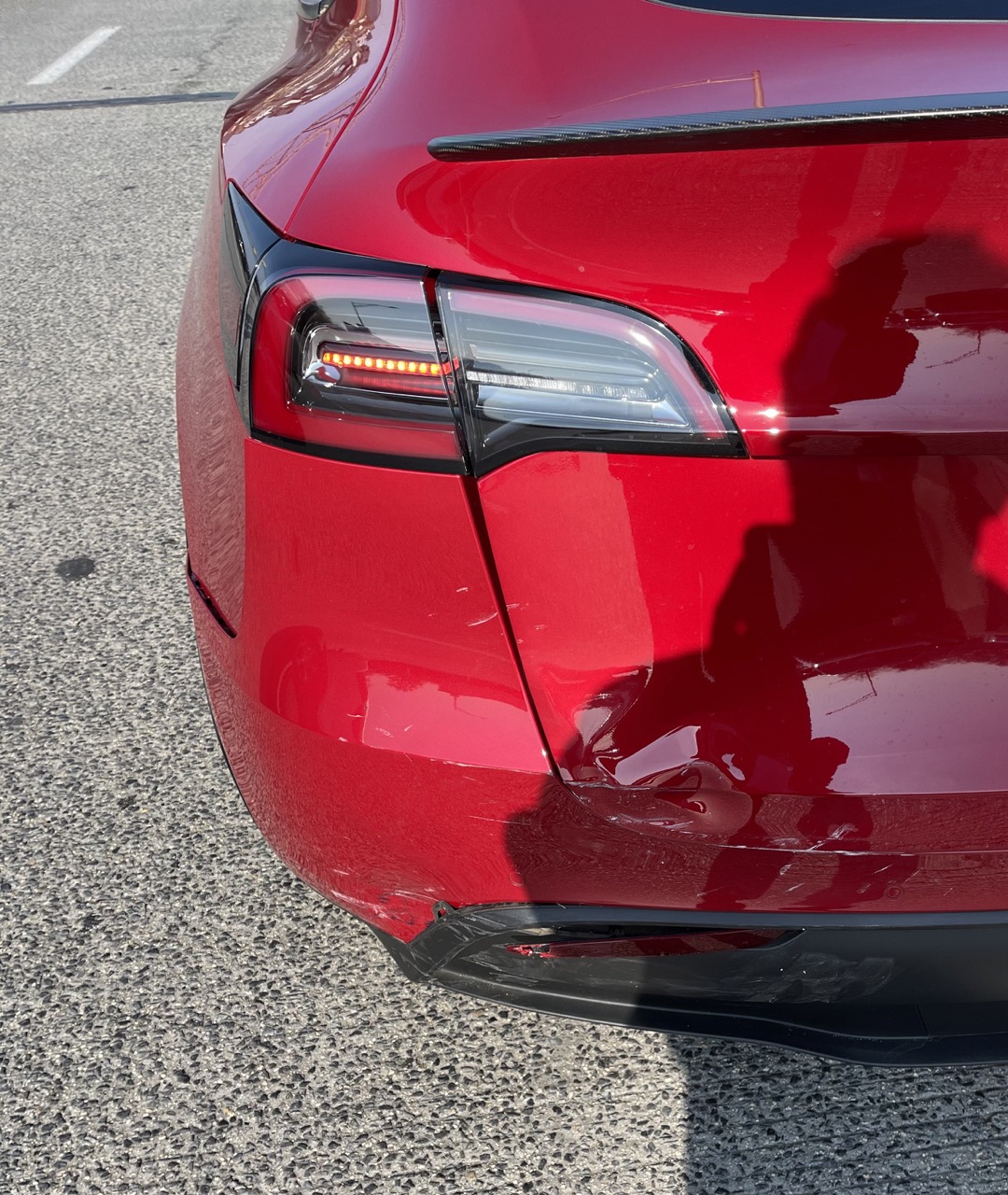
This was the extent of the damage. This was $14k to repair.
Now: To be VERY clear, this has NOTHING to do with being an EV, and everything to do with Tesla's design choices in particular. The problem is that the back hatch had to be replaced along with the bumper.
Did insurance cover a lot of it?
Did insurance cover a lot of it?
Yeah - 100% of it, and most of the rental car bill for the ~month we were without the car since at the time Tesla was prioritizing new builds over making replacement parts available.
Bummer, didn't think about that aspect of repairs. It's easy to assume all cars are built in similar ways and it's reasonably easy to swap things. Tesla's always been different, for better or worse. Some of each I guess.
Yeah, I don't know if it's an EV specific thing or if it's all vehicles, but I have heard of a few makers that are trying to reduce the number of parts by casting larger pieces of the body.
It makes some sense, as it should take fewer people to assemble the vehicle, but it also makes it so any ding costs more to fix.
It makes some sense, as it should take fewer people to assemble the vehicle, but it also makes it so any ding costs more to fix.
Can confirm. We got rear ended a few months after getting the MY:
This was the extent of the damage. This was $14k to repair.
Did insurance cover a lot of it?
I'm going to guess Hertz is self-insured so it's not hard to understand why they might want to pare down that part of the fleet with potential hits like that.
Similar threads
- Poll
- Replies
- 69
- Views
- 3K
- Replies
- 16
- Views
- 1K
- Replies
- 48
- Views
- 3K


